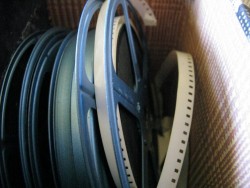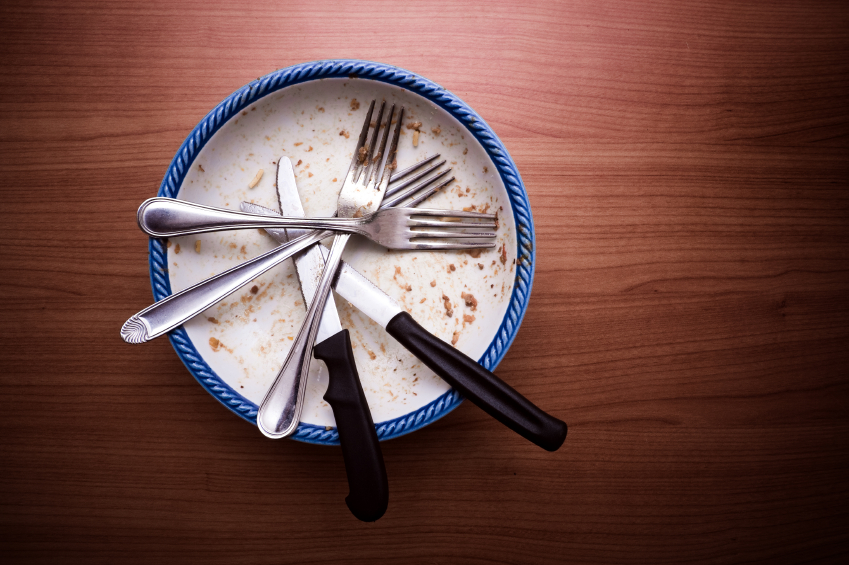Like the thorn under the rosebud, big piles of dirty dishes symbolize the tragedy of existence: pleasure (e.g., the pleasure of eating and cooking) invites pain.
But dishes are more than just a symbol; they also (unfortunately) need to be done, day in and day out. The question becomes: how to do them as painlessly — and harmlessly — as possible? Thankfully, Grist’s own Umbra Fisk has signed off on the automatic dishwasher as the greenest option. “Dishwashers have been proven, again and again, to be more efficient than the typical hand-washer,” Umbra writes.
The choice of detergent matters, Umbra adds, because the conventional ones contain phosphates, ammonia, fragrances, bleach, and petroleum-based surfactants. The key offender is phosphates — which both help get dishes squeaky clean, and end up in wastewater that leaches into waterways, creating fish-killing algae blooms. As companies begin to phase out phosphates, will dishes come out just as clean?
 Without phosphates, are we forked?iStockIn at least one part of the country, some people are answering that question with a thunderous “no.” Compelled to buy hippie-brand detergents by a strict limit on household phosphates, a flood of Spokane County, Wash., residents are streaming over the Idaho border to snap up conventional suds, Associated Press reports. In July 2010, the Spokane phosphate limits will extend to the entire state of Washington.
Without phosphates, are we forked?iStockIn at least one part of the country, some people are answering that question with a thunderous “no.” Compelled to buy hippie-brand detergents by a strict limit on household phosphates, a flood of Spokane County, Wash., residents are streaming over the Idaho border to snap up conventional suds, Associated Press reports. In July 2010, the Spokane phosphate limits will extend to the entire state of Washington.
According to the AP, Spokane residents compelled to go phosphate free complain of dishes “encrusted with food, smeared with grease, and too gross to use without rewashing them by hand.” One observer has even raised the specter of violent reaction: a blogger for the prominent conservative site Red State wondered, “At what point do [Washington residents] get off the couch, march down to their state legislator’s house, pull him outside, and beat him to a bloody pulp for being an idiot?”
Hmm. While the good citizens of Washington mull fisticuffs to avoid greening their dishwashers, I’ve been testing phosphate-free dishwashing detergents for weeks here in western North Carolina, and using them for years in the high-volume kitchen of the sustainable-agriculture project I helped start, Maverick Farms. The consistent result: no food crusts, grease smears, or rewashing at all — just clean dishes.
So why the radically different experiences?
Turns out that the high level of minerals in hard water hinders soap’s ability to clean — and phosphates act as a water softener. Spokane’s water is particularly hard; the water in western N.C. is soft. What that means is that people who live in hard-water areas might have to do a little conscious pre-rinsing to make phosphate-free detergents work. The practice needn’t be a major water sucker.
Rather than pummel public officials or burn fossil fuel by trekking to Idaho for illicit powder, I urge Spokane residents to consider this tip from Umbra: “Pre-rinse your dishes in one of two ways: Either keep a rubber spatula at the sink and squeegee off each dish, or keep a little bowl of water handy and sponge off each dish.”
With the soft-water caveat in mind, here is what I observed from several weeks’ study of leading “green detergents.” As you’ll see, the results are about as exciting as lukewarm leftovers: all of the soaps worked just fine. For these test runs, I didn’t rinse at all; I merely drained glasses and scraped plates. All products are both phosphate- and chlorine-free.
Ecover Dishwasher Tablets
Eco-claim: Plant-based ingredients; minimal impact on aquatic life
These little tablets worked like a dream. Even a plate that had been involved in a fish-breading project came out clear and shiny, with just one little fleck of crusted flour. Points off, though, for the plastic wrapper that swaddles each tablet.
Citrasolv Citradish Automatic Dish Detergent
Eco-claim: Contains no synthetic perfumes or dyes
This is the one I’ve used for years — mainly because it’s usually a little cheaper than the others on the supermarket shelf. It works great, even burnishing the bottoms of deep, fluted glasses crusted with dried red wine. Odd detail: the product contains a “spot prevention agent” called sodium polyacrylate polymer, which the company acknowledges is “not biodegradable.” Environmental Working Group includes this stuff on its list of “polymer derivatives,” which have these health effects: “cancer, reproduction and fertility, birth or developmental effects, organ system toxicity (non-reproductive).” Me, I’d rather have a few spots on my wine glasses than subject my family or the outside world to that stuff.
Seventh Generation Free and Clear Automatic Dishwasher Powder
Eco-claim: Safe for grey-water systems
This widely available brand works well. A small pot that had been used to reduce a tomato sauce and then left to dry overnight emerged sparkly, as did a Pyrex dish used to cook an apple crisp.
Biokleen Automatic Dish Powder
Eco-claim: Concentrated in order to leave the smallest footprint on the environment
Another stellar performer, this one transformed oily pesto residue on a half-dozen plates to a clean, glossy sheen. I wish the company revealed ingredients in individual products on its website, though.
The bottom line: Face it — phosphates in dishwasher detergents are obsolete. If your water is soft like mine, hippie detergents get the job done. If not, learn to live with a little conscious pre-rinsing (see above), and you won’t likely miss old-school suds. All of these products performed like champs. If we eliminate Ecover for its plastic wraps, Citrasolv for its polymer derivative, and Biokleen for its lack of ingredient transparency, we’re left with Seventh Generation.




